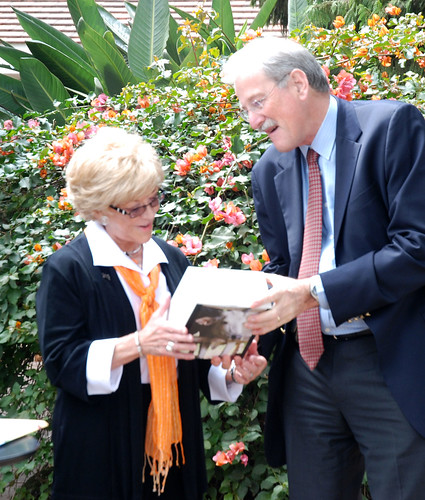Jo Luck, co-winner of this year’s World Food Prize (bestowed this week in Iowa) and president of the Arkansas- and livestock-based NGO Heifer International, receives a present from Carlos Seré, director general of the International Livestock Research Institute (ILRI), when Jo Luck paid a visit to ILRI’s Nairobi, Kenya, headquarters in August 2010 (photo credit: ILRI/Njuguna).
In an opinion piece published today in the Guardian‘s Poverty Matters blog, Carlos Seré, a leading agricultural economist from Uruguay serving as director general of the Africa-based International Livestock Research Institute (ILRI), says that backing smallholder farmers today could avert food crises tomorrow. Agribusiness investment would not only transform the lives of farmers in South Asia and Africa, Seré says, but also boost global food security.
Seré’s editorial follows.
As food riots continue in Mozambique and food crises persist in Niger and elsewhere, leaders in global agriculture, food and development are gathering in Des Moines, Iowa this week to highlight the significant role the world’s smallholder farmers could play in alleviating poverty and hunger.
In sub-Saharan Africa and south Asia, most people still live in rural areas, where they farm crops and livestock or derive other livelihoods from agriculture. With few other ways to feed their families or make a living, billions of rural people will continue to cultivate lands and raise farm animals.
These smallholder farmers form the backbone of global food production. Despite climate change, pests, diseases, water scarcity, and myriad other challenges, small family farms produce more than half of the world’s food. Most of the food staples consumed in the developing world come from small ‘mixed’ farms, which make efficient use of the resources at their disposal by combining crop and animal production.
Smallholders also represent an emerging market opportunity for local and international agribusiness alike. Because opportunity costs for their land and labour are relatively low, these farmers are competitive food producers. Their mixed crop-and-livestock farming systems can compete effectively against large scale commercial operations.
Smart investments by agribusiness could help millions of these smallholders in south Asia and Africa. By helping them to become even more efficient and improving their links to other markets, agribusiness could enable them to make the transition from subsistence farming to remunerative enterprise.
Agribusiness can help farmers gain better access to improved seeds, knowledge, and other agricultural inputs, and link smallholders to local and international private sector enterprises, reducing transaction costs and risks as well as adding value to their agricultural products. Farmers would see a sustainable boost in production and income, while agribusinesses would gain new access to billions of potential buyers.
The award of the World Food Prize this week to Heifer International, a livestock oriented non-governmental organisation, should help promote smallholder livestock production, in particular, as a vital pathway out of poverty and hunger.
Farm animals kept on the world’s small farms serve as the building blocks of prosperity. With global human population rising (it is expected to increase by 2 to 3 billion people over the next four decades, after which it should begin to decline), livestock are becoming agriculture’s most economically important sub sector, with demand in developing countries for milk, meat and eggs projected to double over the next 20 years alone.
A wealth of innovative business opportunities exists for companies to invest in livestock-related enterprises by providing infrastructure, credit, feed, vaccines, or milk cooling systems. Smart investments targeting the developing world’s billions of livestock keepers could greatly increase global food security, as well as generate profits for both livestock producers and agribusinesses.
Small scale livestock enterprises drive dairy production in eastern Africa and south Asia. India is now the largest dairy producer in the world, with most of the country’s milk produced by small farmers. More than 80% of the milk output in Kenya is produced not by large milk companies, but rather by approximately 800,000 small scale dairy farmers. It is sold to customers by some 350,000 small scale milk vendors.
The potential of livestock and the ongoing ‘livestock revolution’ to better the lives of poor farmers in developing countries drives the scientific agenda of the Africa-based International Livestock Research Institute (ILRI). We see the great opportunities livestock offer the poor. Every day, we see how much difference the meat, milk, muscle, manure and money supplied by a cow, goat, pig, camel or other domesticated animal makes to people struggling to produce enough food and income for their families. We see also how much the loss of farm animals – through disease, drought or other disaster – devastates such households.
With the help of agribusiness expertise and increased public investment, we think the world’s smallholder farmers could become a major force in global food security, helping to sustain increasing levels of world food production over the long term.
Read Seré’s opinion piece on the Guardian‘s ‘Poverty Matters’ blog: Backing smallholder farmers today could avert food crises tomorrow, 14 October 2010.
Watch two short filmed interviews of World Food Prize winner Jo Luck on her visit to ILRI in August 2010:

